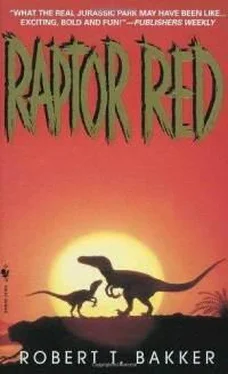Her target is the biggest of the herbivores in the Utah ecosystem, an Astrodon ( star tooth ), a bronto-saurian species with a long neck, a long tail, and a torso built like a ten-ton elephant’s.
Giant size confers a certain ecological arrogance, and astros have a swaggering disdain for predators. In the astro’s mind, any carnivore would be foolish to attack. Millions of years of evolution have built into their brains the comforting knowledge that they face hardly any real threat from meat-eaters. The only giant carnivore species is the ridge-backed acro, Acrocanthosaurus, but these three-ton hunters are very rare.
Even if a full-grown acro did try to attack an astrodon herd, the combined defenses of a dozen astros, totaling more than a hundred tons of enraged vegetarians, would be impregnable.
As the astro herd ambles easily around the edges of the salt lake bed, their big cushioned paws churning up the briny mud, brains routinely check sensory input for danger. No scents are alarming. They pick up the hint of a raptor a hundred yards away, but raptors are eighty-pound predators that wouldn’t dare challenge a twenty-thousand-pound bull astro. The resident raptor species is the commonest predator in the astros' world, and the big plant-eaters see or smell them every day. All the raptors are tiny compared with the star-toothed brontosaurs. Never would the biggest raptor, a 150-pounder, even dream of attacking astros, unless it was lucky enough to find an unguarded newborn calf.
There is a raptor pack ahead, chewing up the carcass of a five-hundred-pound plant-eater (an iguanodont species), but they slink away when a cow astro makes a mock-charge in their direction.
The astro brains go down their genetically programmed checklist for sounds. There’s no cause for alarm coming from this sensory system either. A low undertone of crunching can be made out to the left, under some conifer trees, where a one-ton armor-plated nodosaur is feeding placidly on seedlings. No threat here - the nodosaur moves away when a young bull astro pushes through the trees to investigate.
The big astro eyes, built like hawks' eyes, the size of dinner plates, make rhythmic sweeps of the landscape, stopping to focus in on any movement. Yes, there is a second group of raptors two hundred yards to the right. A different species. But at a hundred pounds, still too small to worry about.
It’s late summer, the time when big bull astros start to joust with each other to impress the females. Dull thuds punctuate the hot still air as the bulls swing their necks, giraffe style, like flexible clubs, aiming blows at each other’s heads.
And it’s a time of new danger for the astros: There’s a newcomer to the resident fauna, a species who has reached Utah after coming across the North Pacific land bridges from its Central Asian homeland.
The bull astrodons pick up the novel scent - the unmistakable aroma of a raptor species, just a little different from the three species the astros are used to. Strange odors usually jingle alarm in any animal’s brain. A strange odor means a creature never met before, a creature whose danger potential hasn’t been evaluated through experience.
But the bull astrodons ignore the new scent. Their danger signal is overridden by their sexual competitiveness, their springtime drive to get the most desirable mate. Hormones are kicking in, actuated by their internal clocks.
Astros have no genetically coded alarm for raptor odor, and the foreign species is giving off merely a new variant of raptorine smell. Millions of years of evolution have built into astro psyches a disdain for these puny predators. Darwinian processes can never prepare any animal for a totally new danger - natural selection gives it only the best response to dangers faced by its ancestors. And not once in their pedigree have adult astrodons suffered a serious loss from a raptor attack.
That evolutionary rule is about to be broken. The cow astros, always more cautious than the bulls, begin to bunch up, surrounding their yearling calves and stretching their necks to catch a glimpse of the raptor that is emitting the strange scent. Cows take no chances with their young, their genetic investment for the next generation.
Two bulls neck-wrestle with wild abandon, clunking each other about the eyes and ears. They don’t pay any heed whatsoever to the new raptor scent, which has now grown very strong. They don’t notice that they are far from the main herd. Their brains are pounding out the same message again and again: Beat this bull, beat this bull, beat this bull, get a cow. In the Darwinian game, bulls must take chances. The females reject most suitors, choosing only the strongest and most vigorous, so a bull will literally risk life and limb to impress a desirable mate.
The cows stop looking at the bull contest. All the cow eyes focus in the direction of the foreign smell. Their minds have switched over to calf-protection behavior. And the cows see what the young bulls don’t. The cows see the attack coming across the lake bed.
The cow eyes follow the light glistening over the broad scales on the thighs and calves of the giant raptors running noiselessly over the hard mud. The bulls still are totally absorbed with their sparring. They don’t see the foreign raptors until the horrible hand claws cut long gashes through their skin and muscle.
Messages of pain jump from the bull astros' skin to their brains. They experience the disconcerting sensation of their own blood dripping down the skin of their stomachs. Now at last the switches flip over in their brains. Switched off are all thoughts of mating. Switched on is terror of an attack more vicious than any they have ever experienced before. One bull manages to break away in a terrified running walk. He screeches high-pitched notes through the sound-making chamber that bulges around the nostrils on his snout. The cow herd screeches in response. The matriarchs bellow in deep warning tones and swoosh their tails from side to side.
The other bull stares at its attackers - a pair of raptors ten times heavier than he has ever seen before. The bull can see and smell his own blood on the three hooked claws carried on each raptor forepaw. Conflicting impulses flood his brain: flee, counterattack, run, or try to crush these new horrors with his front feet.
The raptors attack again from either side. Their long forearms extend outward, and their claws catch the bull’s skin. As soon as a raptor feels its recurved claw tip penetrate the skin, the hand muscles contract instinctively, driving the claw-knives four inches deep into the flesh. Biceps and pectoral muscles flex to the max, pulling the claws through the prey’s body, ripping channels a yard long.
The bull stands stupefied. Pain from two dozen long claw gashes on right and left flanks is overwhelming the normal feedback loops in his central nervous system. No one cut is life-threatening. But the cumulative effect drains his strength.
Again the two giant raptors attack. But this time the bull charges, hurtling his huge bulk forward, whipping his tail right and left. The raptors sidestep the counterattack. They reach out and slap their forepaws against the bull as he stumbles past, leaving a new set of bright red lines on his hide.
The bull is confused. He had won battles the year before with a one-ton ridge-backed acro. But that meat-eater was slow and clumsy compared to these quick-footed giant raptors. The ridge-backed acro had lunged at the bull, grabbing at the bull’s shoulder, trying to hold on with foreclaws shaped like grappling hooks. The bull had shaken off the acro and crushed it to death by pressing it against the ground.
The anti-acro tactics don’t work now. These giant raptors don’t try to grapple and hold on. Their fore-claws act like curved knives, cutting through hide and flesh. And the giant raptors don’t even try to bite: Each new attack is a quick dash and slash, a fast run-up to the bull and then a quick blow by the ginsu-knife claws.
Читать дальше












